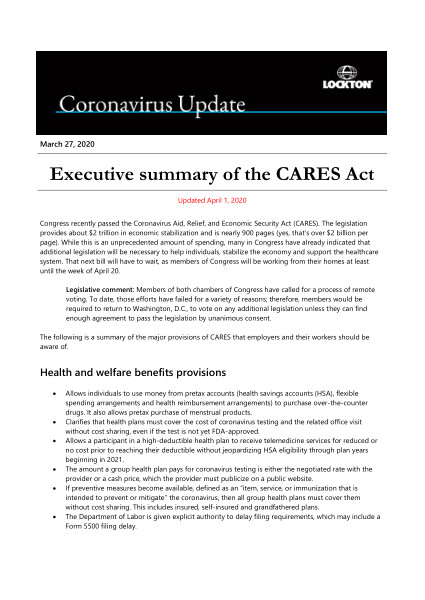Congress recently passed the Coronavirus Aid, Relief, and Economic Security Act (CARES). The legislation provides about $2 trillion in economic stabilization and is nearly 900 pages (yes, that’s over $2 billion per page). While this is an unprecedented amount of spending, many in Congress have already indicated that additional legislation will be necessary to help individuals, stabilize the economy and support the healthcare system. That next bill will have to wait, as members of Congress will be working from their homes at least until the week of April 20.
Legislative comment: Members of both chambers of Congress have called for a process of remote voting. To date, those efforts have failed for a variety of reasons; therefore, members would be required to return to Washington, D.C., to vote on any additional legislation unless they can find enough agreement to pass the legislation by unanimous consent.
The following is a summary of the major provisions of CARES that employers and their workers should be aware of.
Health and welfare benefits provisions
Allows individuals to use money from pretax accounts (health savings accounts (HSA), flexible spending arrangements and health reimbursement arrangements) to purchase over-the-counter drugs. It also allows pretax purchase of menstrual products.
Clarifies that health plans must cover the cost of coronavirus testing and the related office visit without cost sharing, even if the test is not yet FDA-approved.
Allows a participant in a high-deductible health plan to receive telemedicine services for reduced or no cost prior to reaching their deductible without jeopardizing HSA eligibility through plan years beginning in 2021.
The amount a group health plan pays for coronavirus testing is either the negotiated rate with the provider or a cash price, which the provider must publicize on a public website.
If preventive measures become available, defined as an “item, service, or immunization that is intended to prevent or mitigate” the coronavirus, then all group health plans must cover them without cost sharing. This includes insured, self-insured and grandfathered plans.
The Department of Labor is given explicit authority to delay filing requirements, which may include a Form 5500 filing delay.
Retirement provisions
Allows tax relief for retirement plan and individual retirement account coronavirus-related distributions taken by individuals during 2020. Distributions are not subject to the typical 20% withholding requirement and are exempt from the 10% early withdrawal penalty. Income taxes on the distributions may be spread over three years, and the distributions may be repaid during that time without regard to contribution limits.
Doubles the maximum plan loan amount to the lesser of (1) $100,000; or (2) the greater of $10,000 or 100% of the present value of the participant's vested benefit for plan loans made during the 180-day period beginning on the date of enactment.
Permits an additional year for repayment of loan payments due in 2020.
Required minimum distributions (RMDs) are waived for 2020 for all types of defined contribution plans (including 401(k), 403(b) and governmental 457(b) plans) and individual retirement accounts. This also applies to RMDs due in 2020, but attributable to 2019.
Allows retroactive plan amendments for the above provisions to no earlier than the last day of the first plan year beginning on or after Jan. 1, 2022, and Jan. 1, 2024, for governmental plans.
The Department of Labor is given explicit authority to delay filing requirements, which may include a Form 5500 filing delay.
Business stabilization
Enhanced “Payroll Protection Program” loans through the Small Business Administration (SBA) for the period from Feb. 15, 2020, to June 30, 2020. Generally, eligible businesses must have fewer than 500 total employees, which includes self-employed, independent contractors and sole proprietors. Unique employee counting rules apply to hotels, restaurants and franchises. The loans are fully backed by the federal government and can be used to pay operational costs like payroll, rent, health benefits, insurance premiums, utilities, etc. Subject to several criteria, employers that retain or rehire employees may have their loans forgiven. See the Appendix for more details.
UPDATE: The U.S. Treasury released guidance (opens a new window), including an application, for the Paycheck Protection Program loans provided in the CARES Act. Applications can be submitted beginning April 3, and employers are encouraged to contact their financial institutions and apply early, as funds are likely to run out quickly. See Appendix A (opens a new window) to this alert for more detailed guidance from Lockton about eligibility and how to apply.
$454 billion of loans are available to larger businesses, including nonprofits with between 500 and 10,000 employees. Interest on loans cannot be greater than 2% per year, and no payments are required for the first six months. Borrowers must make several self-certifications, including (1) the loan is necessary to support the borrower’s ongoing operations, (2) the borrower will retain 90% of its workforce until Sept. 30, 2020, and (3) the borrower will not outsource or offshore jobs for a period ending two years after repayment of the loan.
UPDATE: We expect Treasury will release details about these loans prior to April 6. Interested employers are encouraged to frequently check Treasury’s CARES Act webpage (opens a new window) for additional details.
Expands the SBA disaster loan program in 2020 and includes a $10,000 advance, which does not need to be repaid if the borrower later proves ineligible.
Eligible employers, including tax-exempt but not governmental employers, can take an “employee retention tax credit” against payroll taxes of 50% of the first $10,000 wages and the cost of providing health benefits from March 12, 2020, through Dec. 31, 2020. Employers are eligible if either (1) their business operations were fully or partially suspended because of orders from a governmental entity limiting commerce, travel or group meetings (e.g., shelter-in-place orders) or (2) experience a year-over-year reduction in gross receipts of at least 50% – until gross receipts exceed 80% year-over-year. For employers with more than 100 full-time employees, only employees who are currently not providing services for the employer due to coronavirus-related causes count toward eligibility for the credit.
Deposits of payroll taxes and 50% self-employment taxes for 2020 wages are deferred over the next two years. Half of the taxes are due by Dec. 31, 2021, the other half are due by Dec. 31, 2022.
Individual stabilization and unemployment
Individuals will receive rebates in the amount of $1,200 per adult and $500 per child. The amounts are phased out for individuals making more than $75,000 and joint filers making more than $150,000.
The bill encourages states to expand unemployment benefits and provides additional federal funds. Notably, it provides an extra $600 to every unemployment check for the next four months and expands unemployment benefits for independent contractors, the self-employed, employees of nonprofits and governmental employers. States are also incentivized to expand the number of weeks of unemployment, to waive the typical first week waiting period and to allow employees who have had their hours reduced claim some unemployment benefits.
Lockton comment: Each state sets its own rules for unemployment benefits, so individuals and employers will want to check the specific rules in their state to understand key considerations like the number of weeks available and whether workers who have had their hours reduced can claim partial unemployment.
Other items included in the bill
Permits employers to pay an employee’s student loan payments pretax, up to $5,250 in 2020.
$300 above-the-line deduction for charitable contributions in 2020.
Limitations on foreclosures and evictions.
Not legal advice: Nothing in this Alert should be construed as legal advice. Lockton may not be considered your legal counsel, and communications with Lockton's Government Relations group are not privileged under the attorney-client privilege.
 View alert (opens a new window)
View alert (opens a new window)


